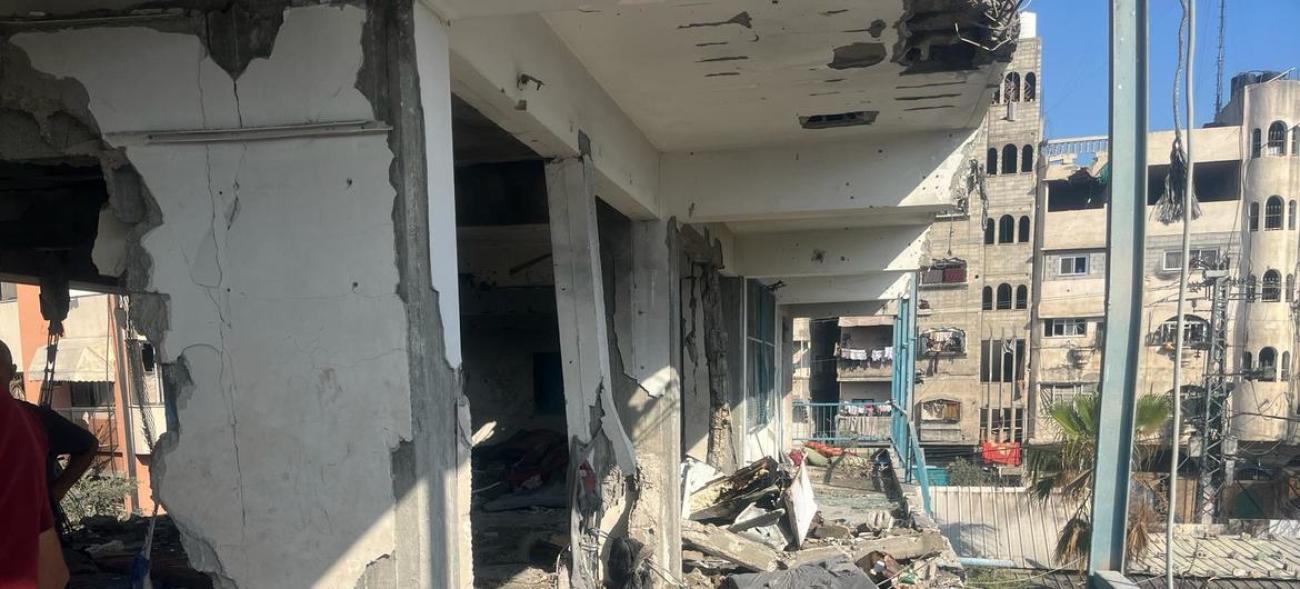Dozens feared dead in Israeli airstrike on UNRWA school in Gaza

Amid early reports that an Israeli strike on a UN-run school in Gaza overnight into Thursday left dozens dead
humanitarians warned that cholera and other potentially deadly diseases stalk people uprooted by the war, forced to live among “mountains of trash”.
"UNRWA can confirm that one of our schools in the Nuseirat area [in central Gaza] was hit overnight/early morning by Israeli Forces. The school was possibly hit several times,” the UN agency for Palestinian refugees told UN News. “The number of those reported killed is between 35 and 45. Scores others are injured. We are not able to confirm the above figure at this stage.”
Speaking at the regular noon briefing, UN Spokesperson Stéphane Dujarric said that the attacks were "another horrific example of the price that civilians are paying."
Children caught up in war
Local officials in Gaza reported that 37 people were killed in the school building attack in the Nuseirat refugee camp near Deir Al-Balah in central Gaza. The toll included 14 children, it was also reported.
Media cited the Israeli military that the strike’s objective was to eliminate Hamas operatives and that it was only given the go-ahead after aerial surveillance, with additional measures taken to reduce the risk to civilians.
In an early response condemning the school attack, UNRWA said that 6,000 people had been sheltering on the premises. Since the war began, more than 180 buildings belonging to the UN agency have been hit, killing more than 450 displaced people in those facilities.
“The vast majority” were schools-turned-shelters, UNRWA said, as it issued a reminder “to all parties to the conflict that schools and other UN premises must never be used for military or fighting purposes…UN facilities must be protected at all times”.
Rubble for a home
The development came as humanitarians issued alerts about the already dire sanitary emergency in Gaza as civilians displaced by the war “have no choice but to live amid the rubble and in destroyed UNRWA facilities”.
In its latest report on relief activities in May, the UN agency flagged that aid teams were allowed to pick up “just under 450 trucks in the past three weeks in support of the humanitarian operation".
"This is nothing in the face of the needs,” UNRWA said, insisting that at least 600 trucks per day “of commercial, fuel and humanitarian supplies” are required to help stave off famine and death in Gaza.
“Fuel is running short; our teams are standing by to pick it up when the Israeli authorities give the green light,” UNRWA said, before highlighting “horrific” scenes of devastation from Jabalia refugee camp in northern Gaza, home to thousands of displaced people.
“All eyes are on the proposal to reach an end to this war through a ceasefire, the release of all hostages and substantial and safe flows of urgently needed supplies into Gaza,” the UNRWA update continued as the US and 16 other countries reportedly expressed their full support for the ceasefire and hostage release proposal presented by President Joe Biden on 31 May.
Cholera killer
As summer temperatures rise, humanitarians also expressed deep concerns that preventable disease outbreaks could spread more widely.
“Children in Gaza are living alongside mountains of trash and raw sewage as basic services reach a breaking point amid continued fighting and displacement,” said Catherine Russell, head of UN Children’s Fund, UNICEF, on X.
The lack of clean drinking water has also fuelled warnings that cholera may strike too, just as healthcare provision remains “crippled”, UN health agency chief Tedros Adhanom Ghebreyesus said.
“Intense hostilities have severely crippled health care provision in Rafah where tens of thousands of vulnerable people still remain,” he said in post on X, noting that the partner medical non-governmental organization (NGO) International Medical Corps had moved its 160-bed field hospital from Al Mawasi to the west of Rafah to its existing facility in Deir Al-Balah.
The World Health Organization (WHO) chief noted that the only functioning field hospital in Al Mawasi was the one run by the International Committee of the Red Cross. In Rafah City, meanwhile, only the United Arab Emirates field hospital currently provides health services, “but is increasingly difficult to reach due to hostilities”, Tedros said.
West Bank spiralling
In a related development in the occupied West Bank, the UN’s top aid official in the Occupied Palestinian Territory (OPT) warned of rising violence, bloodshed and killings, mainly of Palestinians.
More than 500 Palestinians and 12 Israelis have been killed in the West Bank, including East Jerusalem, since 7 October, according to the UN aid coordination office, OCHA.
About 280 olive and fig trees and 580 grape vine trees were also vandalized by Israeli settlers in seven communities across the West Bank during the week-long reporting period, the UN office said in a scheduled update.
“While all eyes are on Gaza, the people of the West Bank must also be supported and protected. The situation here is volatile,” said UN Humanitarian Coordinator for the OPT Muhannad Hadi. “We can’t wait for the West Bank to become another Gaza.”
Mr. Hadi’s comments followed meetings on Wednesday with Palestinian herding and Bedouin communities in the central West Bank. Members and organizations supporting the Palestinian communities reported “heightened violence, settler activities, access restrictions, demolitions and other coercive policies and practices”, OCHA said in its update.
In the same report, the UN aid office said that Israeli forces shot and killed two Palestinian men near a military gate located in the Barrier west of Tulkarm city on Tuesday, “after the two men reportedly opened fire at them. Their corpses have been withheld by Israeli forces”.

